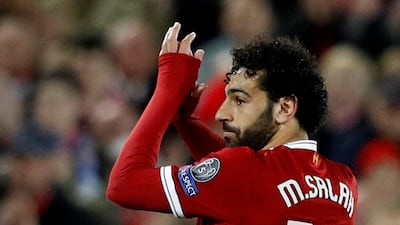For the English, it is sometimes said that football fans regard the sport as close to a religion. And in Egypt, the game is taken very seriously – to put it mildly. I have roots in both countries, but I suppose the two cancelled out within me any deep love for football, apart from playing it a bit as a youngster. And yet, I have been moved, like much of the rest of the world, by the extraordinary Mohamed Salah story that has developed over the past few months.
This young Egyptian, better known as Mo, who plays for Liverpool Football Club, has recently been dubbed an "Egyptian King". His feats on the pitch even prompted CNN to ask if the 25-year-old is now the best player in the world.
That question rather downplays his impact, because he is no longer just a football player. In the few months since his return to the English Premier League, his star has risen rapidly.
Something else stands out: the fandom that exists around Mo Salah. It is all the more noteworthy because of who and what he is: an Arab, Muslim, non-European citizen whose name is Mohamed. And the crowds love him, which is all the more remarkable in an era when right wing populism appears to be on the rise in Europe and elsewhere.
Read more: Footballer Mo Salah is tackling Islamophobia head-on
That is no small feat. Across the continent and the West more generally, that kind of populism is directed at precisely what someone like Mohamed Salah represents. The populist rhetoric against Arab migrants – especially Syrian refugees – is intense. The rank anti-Muslim bigotry that has become so mainstream across the political spectrum is not subsiding. And yet, against that backdrop, an Arab with the most Muslim name there is, is being worshipped by football fans across the continent. Moreover, he is unashamedly Muslim, on and off the pitch. And in response, western social media makes friendly jokes about how Liverpool fans will embrace Islam en masse as long as he keeps scoring.
But note, Salah is not a Brit of Egyptian origin. He is Egyptian through and through – and therein lies another intriguing part of his story. Egyptians have been through a rough time in recent years, but for the first time in a long while, Salah has inspired a renewed national pride, across different boundaries, political and otherwise.
Read more: Salah's Liverpool hot streak propels him towards scoring records
When Salah was announced as the Professional Footballers’ Association Player of the Year last weekend, Arab social media used the hashtag "The Legend Mohamed Salah" more than 25,000 times on Twitter and some Egyptian papers named him "Lionheart".
His appeal may be immense in Europe, but it is on another level entirely for young Egyptians and other Arabs.
Famed Lebanese and Syrian singers, such as Yara and Sahar Abu Shrouf, with millions of followers, congratulated Salah. And if you listen to Arab TV sports commentators when Salah is playing, you are not greeted by normal commentary.
The Liverpool forward is described by a non-Egyptian commentator as the "Sultan of the English Premier League", the "star of the Egyptian game" and the "pride of the Arab game".
In this particular game, it is common that such achievements lead to bravado and aggrandisement. Indeed, some football players create entire personas around presenting themselves as arrogant and conceited. It is another refreshing aspect to Salah, particularly in this age of personality cults, that he doesn’t refer to himself in the third person or boast about his achievements.
______________
Read more: In Salah's hometown not everyone supports Liverpool, but all root for him
______________
In interviews with him that I watched, I saw a humble person, someone who inspires appreciation of humility. I do not know of many public figures in his region today who exhibit that quality. On the contrary, autocrats, populists and dictators seem to like nothing more than to remind their followers of how wonderful they are. At every chance he seems to get, Salah reminds his audience about how he owes so much to his team, rather than talking about how much they are in debt to him.
I do not normally write about sports personalities, but Salah truly is exceptional – and one hopes that he inspires more of his generation, in Egypt and the Arab world, to see what they are truly capable of. They could do so much – if only they were allowed to.












